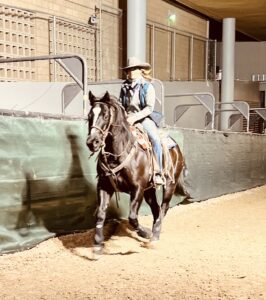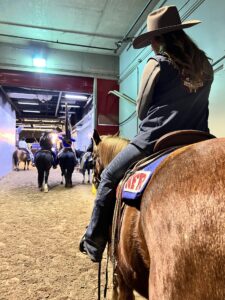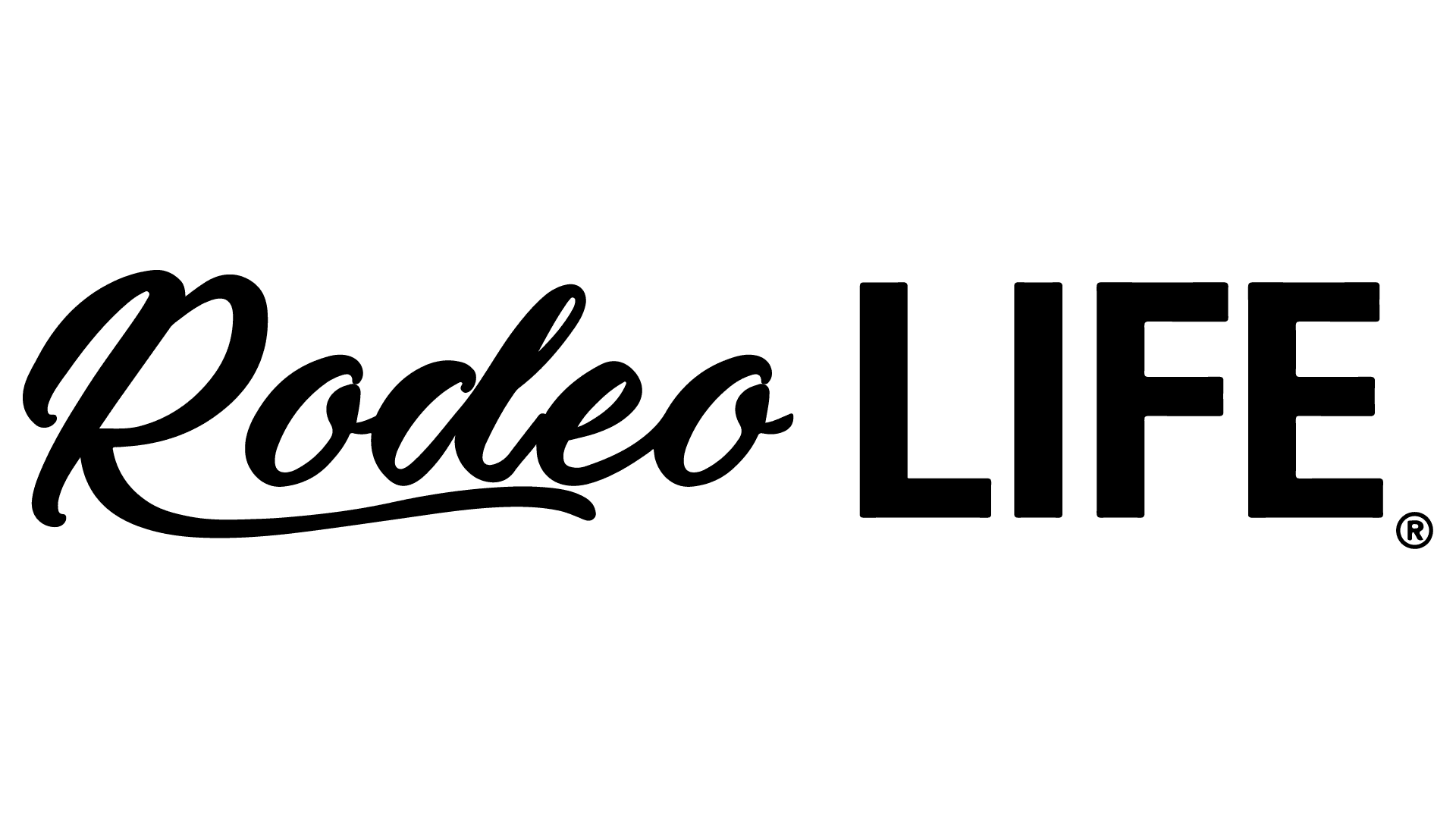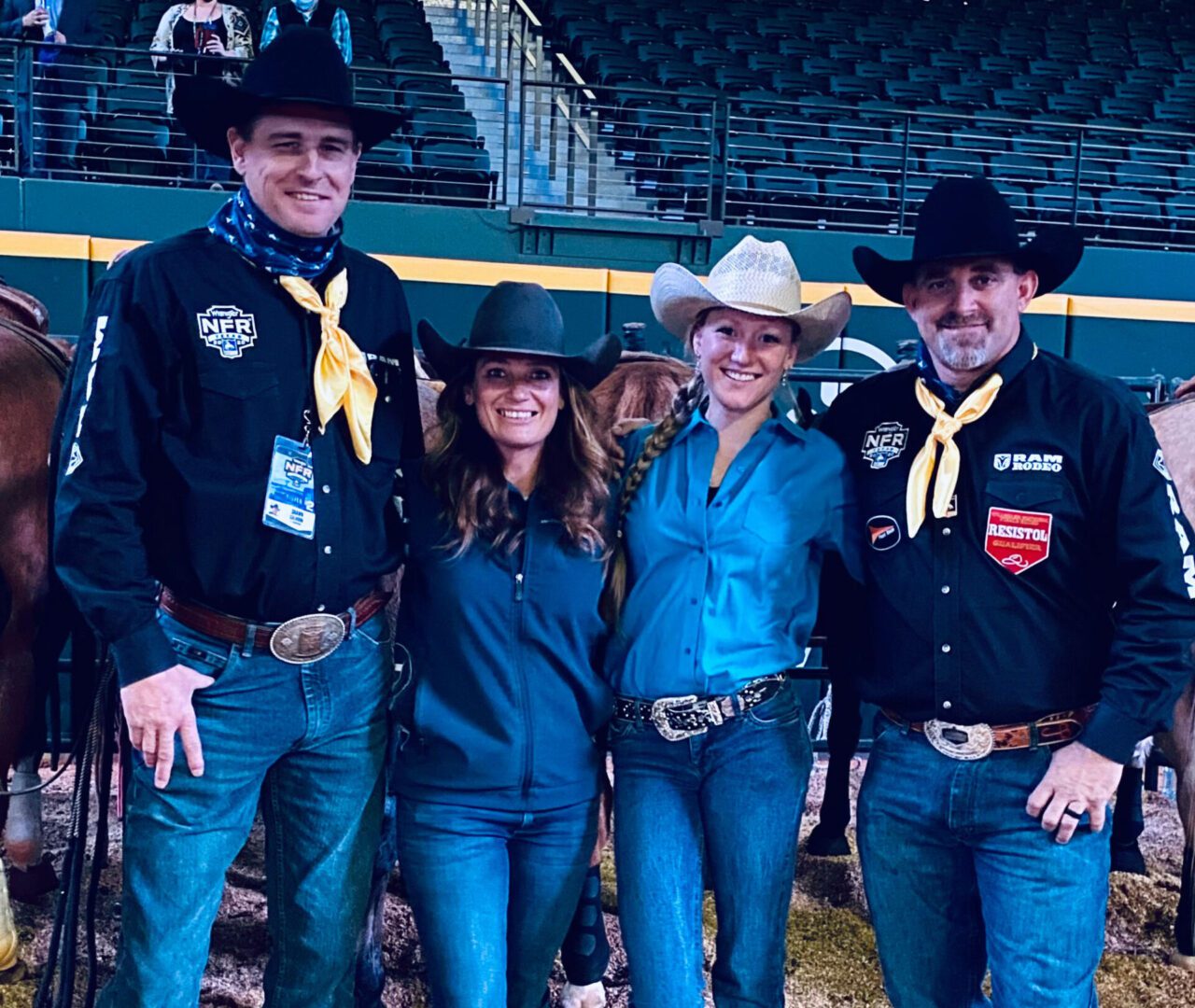Raina Hudson-Chavez has been selected as the saddle horse boss at this year’s Wrangler National Finals Rodeo.
 As boss, she is responsible for the 74 horses ridden for various uses at the Wrangler NFR, and the eleven people under her, who help care for, tack, and exercise the horses.
As boss, she is responsible for the 74 horses ridden for various uses at the Wrangler NFR, and the eleven people under her, who help care for, tack, and exercise the horses.
Those animals include 24 black flag horses, ridden by the flag girls for the grand entry pivot and sponsor flags (called the front end horses), 30 horses ridden by the saddle bronc and bull riders during the states grand entry, two horses for judges, four ushers’ horses, and pickup horses, owned by the pickup men but housed at the Thomas and Mack Arena in Las Vegas.
Her and her cohorts’ workday starts at about 6:30 am, when they come in to clean, feed, water and exercise horses. They usually leave at about 11 am, then come back by 2 pm for that evening’s performance. They’re there till the rodeo is over, at about 9:30 pm, after the last of the horses, the pickup horses, are unsaddled, cooled out and settled in for the night.
Of the eleven people under her management, two cowgirls are assigned to the pickup horses. The other nine people each get six to seven horses to care for, water, feed and ride, the same horses every day.
It’s a tight-run ship; everything has to run on schedule for rodeo production, Raina said.
The saddle bronc and bull riders come for their horses for the states’ flags grand entry in a staggered fashion, not all at once. But when the grand entry is over, when all of those horses return, “they all come back at the same time, so you’re trying to make sure the horses get put in the right stalls.”
The two cowgirls assigned to the pickup horses help with the switch of horses during the bareback and saddle bronc riding. It’s a fifteen second switch, Raina said. “The pickup men are running at you with their hot horses, and you’re holding the fresh horses. (The cowgirls) needs to swap that off fluidly to where you’re not in their way, but you’re also keeping everybody safe and the horses are not out of control.
“Those swaps are exciting and it’s fast-paced and you have to be on your game.” The crew helps exercise the pickup horses in the morning, and warm them up during the performances.
Horses are usually exercised in the morning. The exercise pen is the same area where the arena dirt for the Thomas and Mack arena is stored throughout the year. The dirt is gone, leaving an area of about 200 feet long by 100 feet wide. Contestants warm up their horses in the same pen, but when it gets crowded, everyone is respectful of others, Raina said.
Their work begins a week before the Wrangler NFR starts. The state grand entry horses are borrowed from stock contractors, and Raina and her people ride every one of them, “getting any kinks worked out of them,” she said. “We can see where each horse is at.” (The timed event contestants and barrel racers ride their own horses and the bareback riders don’t ride in the states grand entry; they’re getting ready to compete.)
Before the Finals starts, the crew gets stalls ready and bedding put out for not only the horses in their care, but for the contestants and rodeo acts as well.
After the ten days of the Wrangler Finals are over, she and her people tear down, storing the water hoses, tack, and other equipment in a storage unit. They help in organizing the stock contractors’ tack and their horses as they are loaded and ready to leave.
Raina grew up in Michigan, the daughter of Howard and Joyce Overholt, competing in the IPRA but mostly helping her dad at horse sales and with training horses. The family often had 300 head that her dad, a horse and cattle dealer, bought and sold.
“I was the guinea pig,” she said, of her youth. “Any horse my dad bought, I was the one who got to jump on and see what was broke and what wasn’t.”
Raina was given the “problem” horses and often had a string of 15 to 20 to ride. “I would work with them, and my dad would usually sell them.” The experience she gained working with those horses is part of how she makes a living now.
Living in Brighton, Colo., with her husband, Adrian Chavez, she puts on clinics, gives riding lessons and works with a variety of horses. “My clients bring me all types of horses, and it’s been fun getting to work with them,” she said. She’s compiled a list of what she’s termed the “micro-expressions” a horse gives: a slow eye blink or the flick of an ear, for example, and teaches her clients how to read those expressions. “My clinics teach people how to connect with their horses and read their body language. It’s stuff we take for granted when we grow up with it.”
She and Adrian operate the Twisted Arrow Ranch in Brighton, where they breed their own horses and raise them for roping and barrel racing.
Raina got her start at the Wrangler NFR in 2013, through Floyd Campbell, who worked with the Finals saddle horses. She was galloping race horses at the Arapahoe Park Race Track in Aurora, Colo., where Campbell also worked, when he asked her to help. For the first few years, she was assigned to the grand entry horses, then to the pickup horses. She helped wherever she was needed. “Whatever job needed to be done, I would jump in and help. It got to where people came and asked me for help.”
TVs are placed around the tunnel and warm up tents where Raina and her crew work, but they don’t get to watch much of the rodeo, and she’s fine with that.
 “I like the behind the scenes stuff. But you can stop and watch and catch up with things.”
“I like the behind the scenes stuff. But you can stop and watch and catch up with things.”
Working behind the scenes at the Wrangler NFR calls for a disciplined person, she said. “For the job to be done correctly, you need people who are self-starters and self-motivators. You show them the job, then they understand it and want to keep doing it. You don’t want to have to micromanage people at the Finals. They need to be able to do the job they’re hired for, and be able to think through things on their own.”
The job isn’t easy, but it’s very enjoyable. “You have to love rodeo and the whole atmosphere of it, because it’s a lot of work, and hard work, but if you love it, it’s not.
“I enjoy the rodeo crew and all the people, the way they come together. I don’t think you get that in any other sport. We’re all there for one cause.
“It’s an honor just to be there.”









